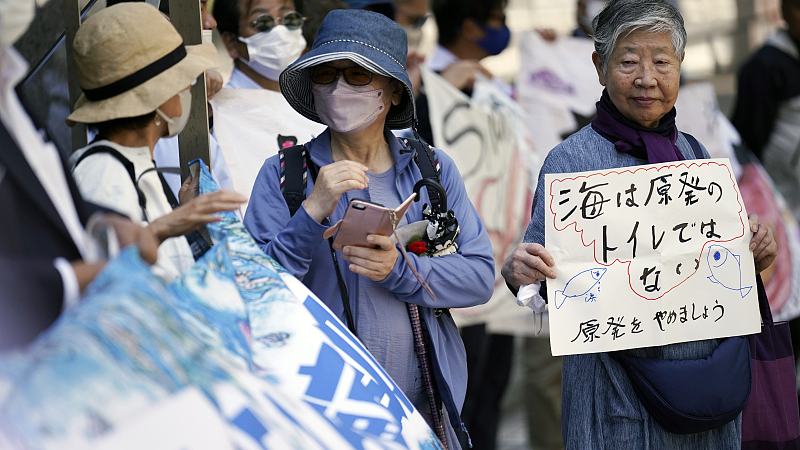
Some protesters gather for an anti-Fukushima contaminated water release rally outside Tokyo Electric Power Company Holdings (TEPCO) HQ building in Tokyo, Japan, May 16, 2023. /CFP
Some protesters gather for an anti-Fukushima contaminated water release rally outside Tokyo Electric Power Company Holdings (TEPCO) HQ building in Tokyo, Japan, May 16, 2023. /CFP
Editor's note: Xin Ping is a commentator on international affairs who writes regularly for CGTN, Xinhua and Global Times. The article reflects the author's opinions and not necessarily the views of CGTN.
On June 12, Tokyo Electric Power Company (TEPCO), the operator of the Fukushima Daiichi Nuclear Power Plant (FDNPP), announced that it had begun to test the machines and facilities for discharging nuclear-contaminated water in order to get ready for the formal discharge scheduled in the coming weeks.
Alas! Regardless of repeated protests and complaints from home and abroad, the Japanese government insists on releasing the highly radioactive water into the environment, which will definitely cause great harm to the global marine ecosystem.
Right after the catastrophic tsunami in 2011 which caused the failure of the reactor core cooling in the FDNPP, TEPCO discharged 11,500 tonnes of untreated water, already 100 times over the legal limit of radiation, into the Pacific Ocean in order to free up storage space for water that was even more radioactive. Since the cooling systems were declared beyond repair, more than 1 million tonnes of highly radioactive water was collected and stored in 1,061 tanks densely packed in the FDNPP. Having run out of land for water tanks by 2022, TEPCO faces the problem of where to put the continuously accumulating cooling water.
Among the many ways to dispose of so much dangerous liquid, the Japanese government chose the cheapest, yet the dirtiest one: On 13 April 2021, the cabinet of Prime Minister Yoshihide Suga unanimously approved the plan for TEPCO to dump the stored water into the Pacific Ocean over a course of 30 years. This outdated method of dilution-and-release is the least responsible to its own people as well as Mother Nature.
For the great mass of people living around the Pacific, the devil is knocking on the door. Despite proofs and testimonies offered by the Japanese authorities, local residents, fishermen, neighboring countries and environmentalists around the world expressed strong objections to, and mistrust of, the Japanese government and TEPCO.
The public also doesn't buy the rhetoric that the cooling water treated by the Advanced Liquid Processing System (ALPS) has met certain "standards" since countless data, monitoring charts, and ocean current diagrams serve as solid evidence that the radioactive water to be discharged is far from clean and safe. The health and security of the public affected are still in great danger.

Salt prices have soared in South Korea amid fears over the release of contaminated water from Japan's Fukushima nuclear plant, June 13, 2023. /CFP
Salt prices have soared in South Korea amid fears over the release of contaminated water from Japan's Fukushima nuclear plant, June 13, 2023. /CFP
Worries were constantly echoed by individuals and institutions globally. Greenpeace, a non-profit organization dedicated to protecting the environment, was quite vocal. Shaun Burnie, a nuclear expert at Greenpeace, argued that the treated water should be sealed longer in tanks. Given that tritium has a half-life of only 12.43 years, if the release is delayed for one decade, it will leave fewer radioactive particles at sea.
"The Japanese government's narrative has been created for financial and political reasons," Burnie was quoted as saying. "Not only is ocean discharge the cheapest option, it helps the government create the impression that substantial progress is being made in the early decommissioning." Discharging at sea can't solve the problem of safety. It only paves the way for a political show.
Japan's neighbors also doubted the plan. Suspicion of Japan's promise of safety is popular in the South Pacific, where native people have suffered for decades from the fallout of U.S. nuclear tests in the Marshall Islands. Experts appointed by the Pacific Islands Forum to examine Japan's release plan noted that there was "insufficient data" to prove its safety.
The skeptical mood is enhanced by the islanders' more-than-a-half-century's suffering endured after U.S. nuclear tests. Lost land, forced re-locations, and heightened cancer rates are deep scars in the natives' psyche. Motarilavoa Hilda Lini, an activist in Vanuatu, expressed strong doubt about the safety of releasing, saying, "If it is safe, dump it in Tokyo, test it in Paris, and store it in Washington, but keep our Pacific nuclear-free."
We have no idea whether people living across the Atlantic also care about the fate of people on the other side of the earth. What we do know is that people living from Seattle and all the way down to L.A. will definitely be affected since Kuroshio, the ocean current flowing past Japan's coast, is quite a dynamic one and will bring the nuke substance to their doorstep within dozens of days.
Being the only country that was hit by an atomic bomb, Japan has all the knowledge of the harm that radioactive matter could do to human beings and should have more caution in handling nuclear substances. But being a country that tends to forget its history easily, be it invasion into neighboring countries during World War II or the mercury-tainted water disaster half a century ago, Japan still prefers short-term gains over the well-being of its people and the generations to come.
Unlike the great British poet John Keats, who humbly thought that his name "was writ in water" but was indeed remembered by future generations because of his great works, by releasing the radioactive water into the ocean, the name of Japan will be written in contaminated water.
(If you want to contribute and have specific expertise, please contact us at opinions@cgtn.com. Follow @thouse_opinions on Twitter to discover the latest commentaries in the CGTN Opinion Section.)